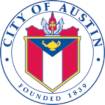
City of Austin
FOR IMMEDIATE RELEASERelease Date:
Grant awarded by the National Oceanic and Atmospheric Administration will help advance heat mapping and community engagement efforts
Contact:
Monica Kortsha, University of Texas at Austin | mkortsha@jsg.utexas.edu
Shannon Stewart, Office of Sustainability | shannon.stewart@austintexas.gov
Austin is known for its hot summers, but heat isn’t felt the same way across the city. Residents living in more shaded, tree-covered areas are experiencing heat differently than others who live near more pavement and roadways, for example.
A partnership between the University of Texas at Austin, the City of Austin, community groups, and East Austin residents aims to find out where hot temperatures affect people the most — and propose solutions to cool those places down.
The two-year project has three main goals: creating dynamic heat maps that plot how people experience the heat alongside actual temperature measurements; using those maps to develop strategies to cool down temperature hot spots; and finally, presenting the data and potential solutions to community members and City decision-makers.
The temperature measurements will start in early July, and last through the summer. The temperature maps will include the entire city, but the project team will focus on collecting public input and making improvements in East Austin, where residents encounter hot spots more frequently.
“This project will help businesses and communities, and it is helping students to develop a purpose for their research,” said project lead Dev Niyogi, a professor at the UT Jackson School of Geosciences and Cockrell School of Engineering. “They are not simply trying to develop an analysis or a plot, it’s a project that means a better life for someone if we do this right.”
The project is one of four chosen by the National Oceanic and Atmospheric Administration (NOAA) announced on June 29 to combat extreme heat in urban environments. It builds on a heat study in East Austin led by the City of Austin’s Office of Sustainability last summer that recruited 17 volunteers, including Niyogi, to collect heat measurements.
“Extreme heat caused by climate change is a major threat to our community,” said the City’s Chief Sustainability Officer Lucia Athens. “This grant will allow important work to continue on heat mitigation in areas of our city that are most affected.”
By using a combination of satellite data, on-the-ground sensors, and computer models, the heat maps will be able to give a view of the temperature landscape that can go from all of Central Texas to a single street, with temperature readings ranging from every 1,000 square feet to every 3-10 square feet.
However, measurements and models don’t always give a complete picture and may differ from how residents are experiencing heat. To ensure temperature readings and community experiences are aligned, the project team will incorporate resident input from the very beginning, engaging in discussions about temperature hot spots in their communities and receiving feedback on temperature maps.
“The data isn’t complete without feedback on how residents are truly experiencing heat,” Athens said. “They are the experts in their community.”
There are many ways to reduce heat in specific areas, from adding greenery to installing light-colored pavement. To make sure any proposed solutions hold up over time, the researchers will investigate how they will affect local temperatures in the coming decades.
About the University of Texas’ Jackson School of Geosciences
The Jackson School of Geosciences at The University of Texas at Austin is among the most established and well-regarded geoscience programs in the world. The school includes the University’s Department of Geological Sciences, one of the country’s oldest geoscience departments, and two world-renowned research units, the Institute for Geophysics and the Bureau of Economic Geology. Find more information at www.jsg.utexas.edu.
About the City of Austin’s Office of Sustainability
Austin’s Office of Sustainability works to ensure a thriving, equitable, and ecologically resilient community by providing leadership, influencing positive action through engagement, and creating measurable benefits for Austin. The Office works to achieve net-zero community-wide greenhouse gas emissions by 2050, a healthy and just local food system, resource-efficient strategies for municipal operations, tangible projects that demonstrate sustainability, and a resilient and adaptive city. Find out more at www.austintexas.gov/sustainability.
